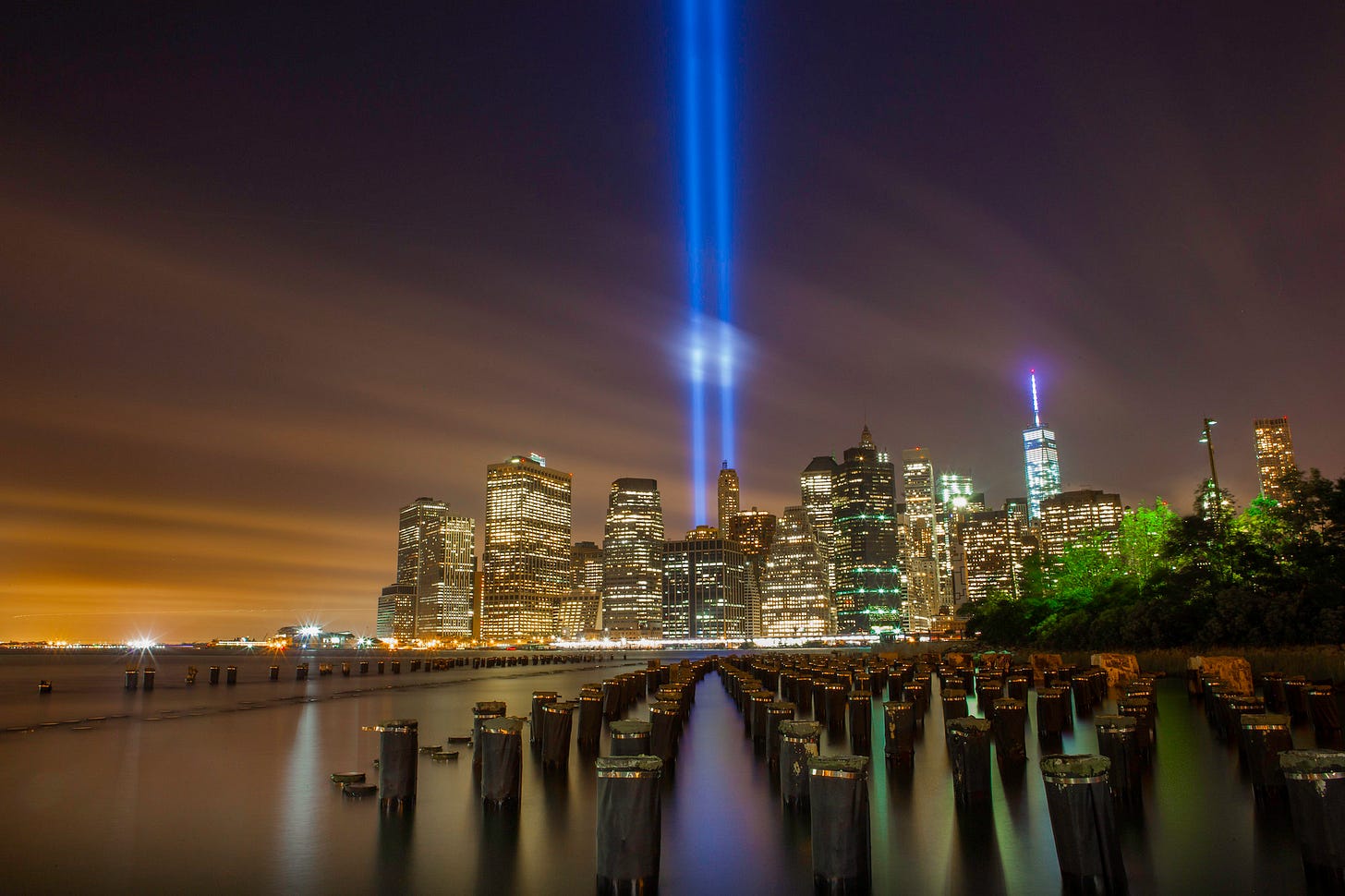ENGINE COMPANY
In remembrance of those we lost and in honor of those who helped
This post was originally published in the New York Times on November 4, 2001. I am honored to still be friends with Captain Cary Darnell.
*****
On Sept. 19, my husband, John, and I had several remarkable house guests: seven firefighters from Gary, Ind. A few days earlier, these men had pooled their money, rented a van and driven halfway across the country to help out in a city they had seen only in the movies. Within 20 minutes of arriving in New York, they were on the bucket brigade at ground zero at the site of the World Trade Center attacks. Gary's Rescue Squad 2, known as the Dogs of War, are experts at rescues in confined spaces. They are firemen's firemen. After their first 12-hour shift, they ate cheeseburgers at Bar Odeon (which, like many restaurants in the neighborhood, was feeding rescue workers for free) and, using their helmets as pillows, stretched out and fell asleep on the West Broadway sidewalk.
They came to New York as a unit, and they wanted to stay together. The sight of seven soot-covered firemen asleep on a city sidewalk ignited an outpouring of invitations. But they politely declined, feeling that seven guys were way too much of an imposition. My friend Joanna, whose family had been staying with us at our Greenwich Village apartment until it was safe for them to return to their loft, gave the firefighters our phone number. (We had been renovating our apartment, and had an empty bedroom and bathroom.) When Joanna's family was able to return home, we asked her to offer our extra room to someone else in need. Within two hours, I met Indiana's bravest in the lobby of our building and gave them a key.
John and I entertain quite often. We are easygoing hosts who follow one simple rule: ''Off the floor by 40,'' meaning that by the time we hit middle age, guests could no longer crash on our floor. But since we didn't have seven extra guest beds, we bent the rule and made bedrolls with extra blankets and towels donated by our neighbors.
This was hospitality on the accelerated plan. Usually I would put a book of poetry on the bedside table, as well as fresh flowers and a pitcher of ice water. This time I put out a toiletry kit in the bathroom with emergency eye-wash solution, foot-itch powder and 10 bars of soap. (It was their first shower in six days.) I wrapped a dozen disposable razors and shaving cream in freshly laundered face towels, but the guys were discouraged from shaving. They couldn't risk getting a nick on their skin that could become infected from the smoky, dusty air at ground zero. At night, before my husband and I went to sleep, we would fill a basket with fruit, cookies, chocolate and Krispy Kreme doughnuts and deposit it at their door.
As house guests go, they were superb. They were polite, gracious and appreciative; we loved having them stay with us. They must have leapt about their bedroom like the bamboo sword-fighters in ''Crouching Tiger, Hidden Dragon,'' because we never heard them. These were seven big, strong men in steel-toed boots. During the day they stomped around like a team of Clydesdales; at night they were silent as a sphinx.
They worked 12-hour shifts with the rescue effort, and when they were not at the site of the attack, they attended the wakes and funerals of their brothers from the F.D.N.Y. They probably saw more dead firefighters in one day than an entire company of firefighters would see in a lifetime. They visited firehouses that had endured unendurable losses. I am stunned by their majestic reticence.
On the morning before they left, all seven joined me for a cup of coffee. It was the first time we had all been together. They refused to sit on our upholstered furniture because they had been wearing the same trousers all week. We spread out on a few hard chairs and talked. Not about the destruction, but about their lives and impressions of my hometown. They were astounded by the way New Yorkers had welcomed and embraced them. One of the guys, George Humphries, got his first massage at ground zero. He thought it was amazing, but he felt guilty and asked the masseuse to stop after 15 minutes so he could go back to hauling buckets. Captain Cary Darnell, who never seemed to sleep, was the personification of leadership. He also filled me in on a lot of the private jokes about his men.
Probably every firefighter in the country wanted to be in New York City to help out, but there are fires that need to be put out every day in every town in America. The guys from Rescue Squad 2 came as firefighters, but they also came as friends. The crew from our neighborhood station, Firehouse 18, which lost seven men, had trained in Indianapolis with them. One of the missing firefighters, Andrew Fredericks, had given Captain Cary the nickname ''Cary From Gary.''
On their last night in the city, a group of us planned a dinner for the guys at Bar Odeon. If 99 percent of success is showing up, we wanted to thank them for coming here to help us. At dinner, the restaurant roared with cheers of appreciation. So many fellow New Yorkers came over to thank them that I considered setting up a kissing booth and asking people to donate $5 to thank a firefighter. We would have collected thousands for the Twin Towers Fund.


